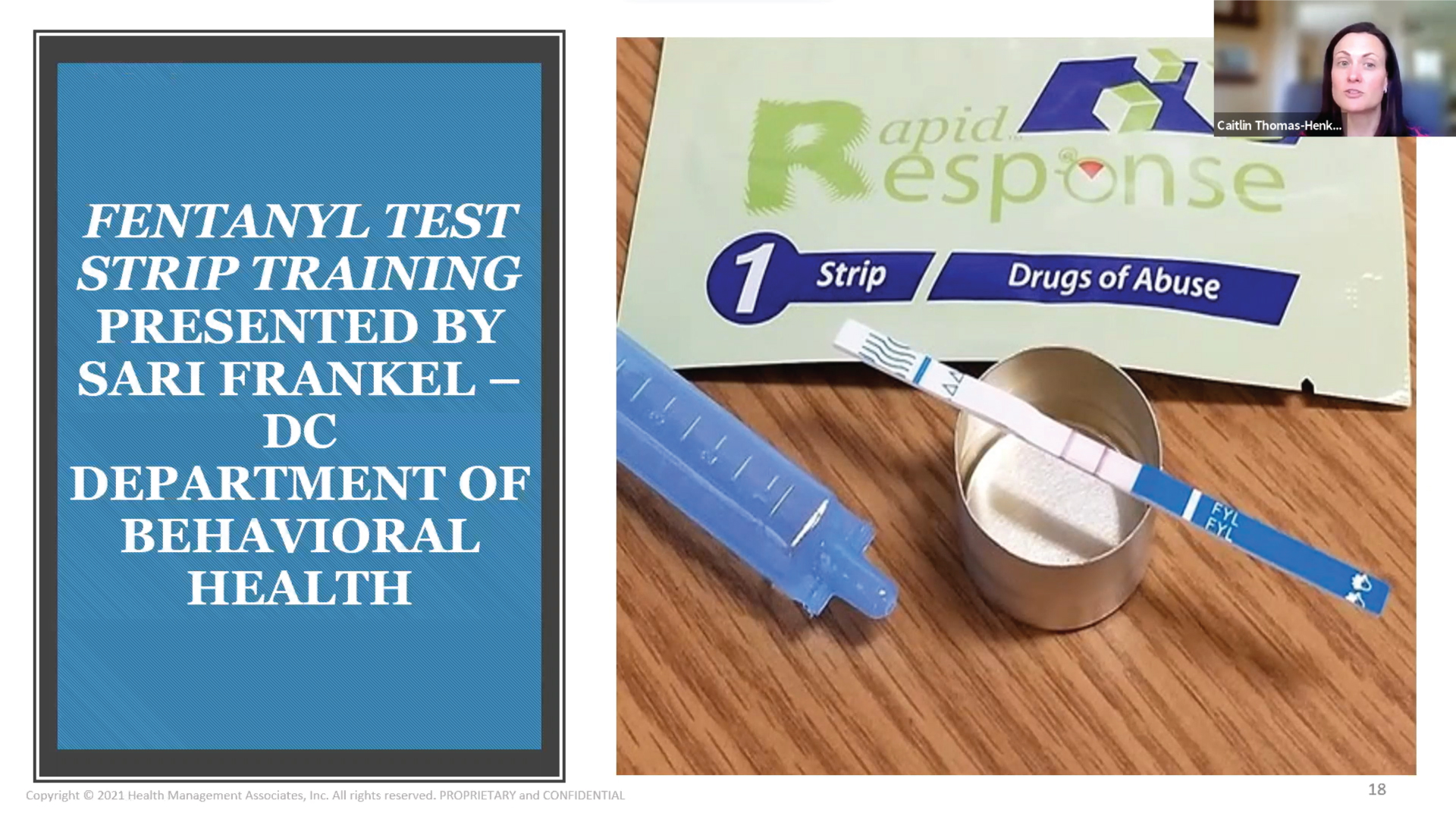

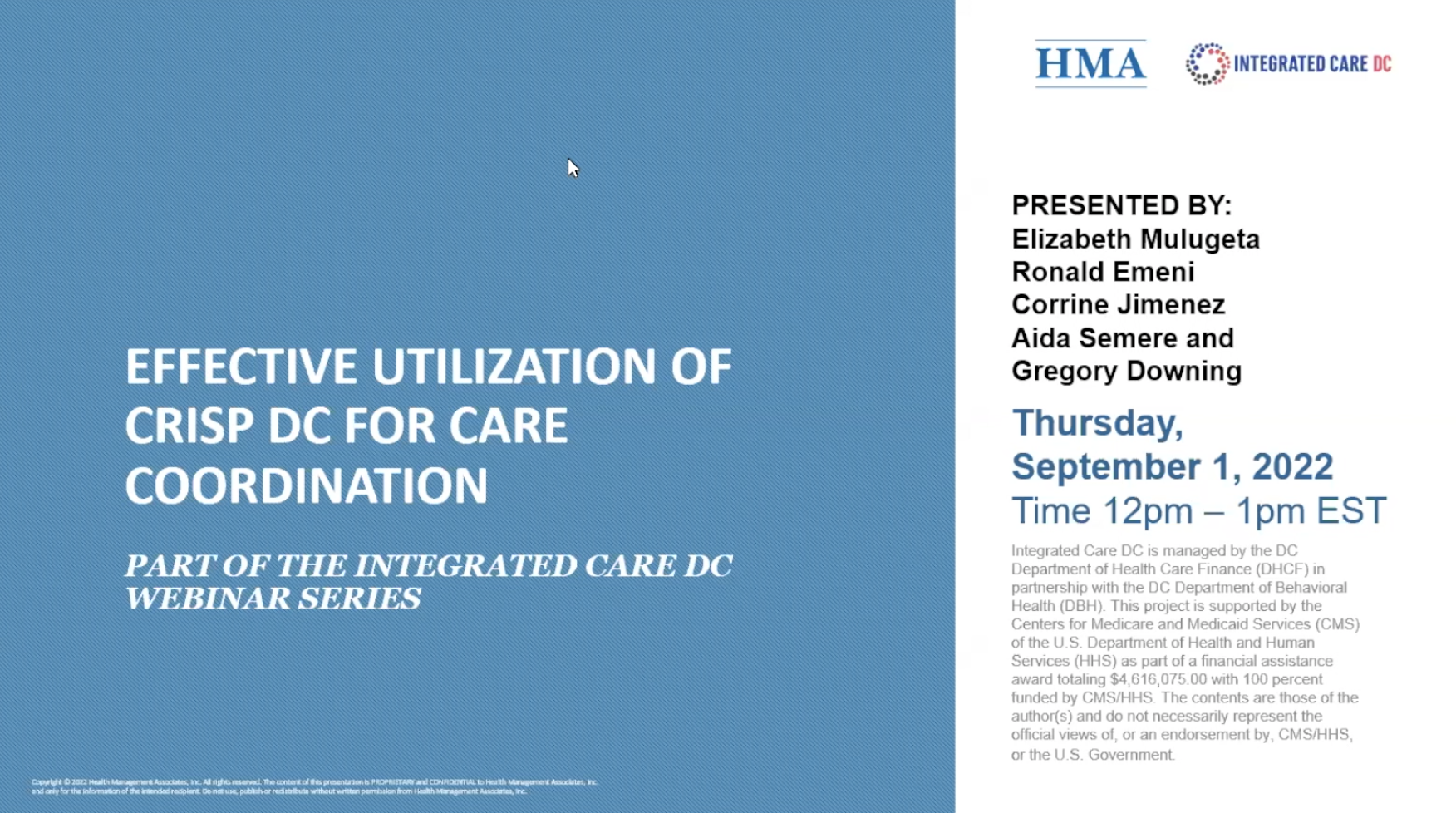
Effective Utilization of CRISP DC For Care Coordination By Outpatient Behavioral Health Providers (DCHA Transitions of Care 2)
Representatives from CRISP DC demonstrated how to use the platform to improve care coordination for patients across the healthcare system.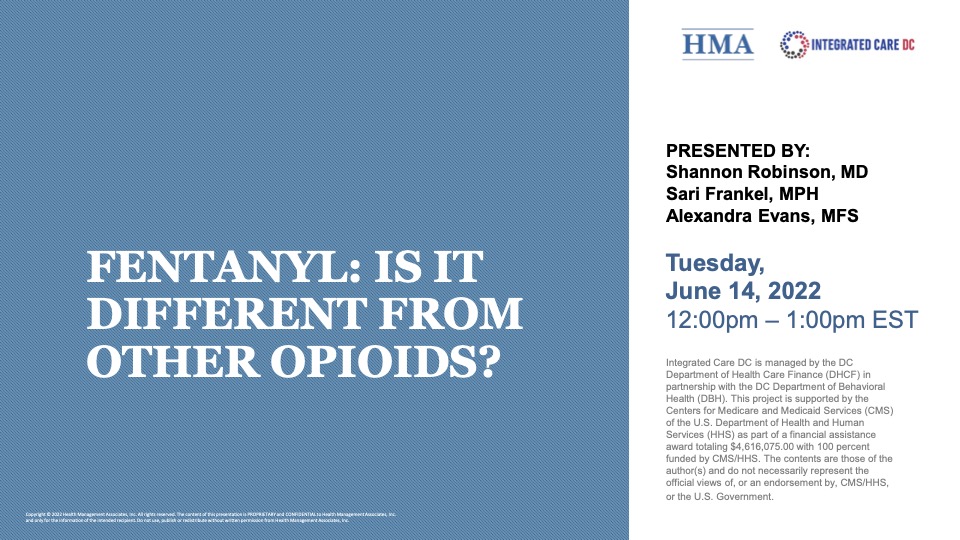
Fentanyl: Is it Different From Other Opioids? (Harm Reduction Session Part 3)
Fentanyl continues to have an increased presence in the drug supply necessitating reconsideration of prevailing treatment approaches for OUD. This session will explore inadvertent exposure and aspects of OUD treatment that may require updating given the high level of fentanyl now experienced in DC.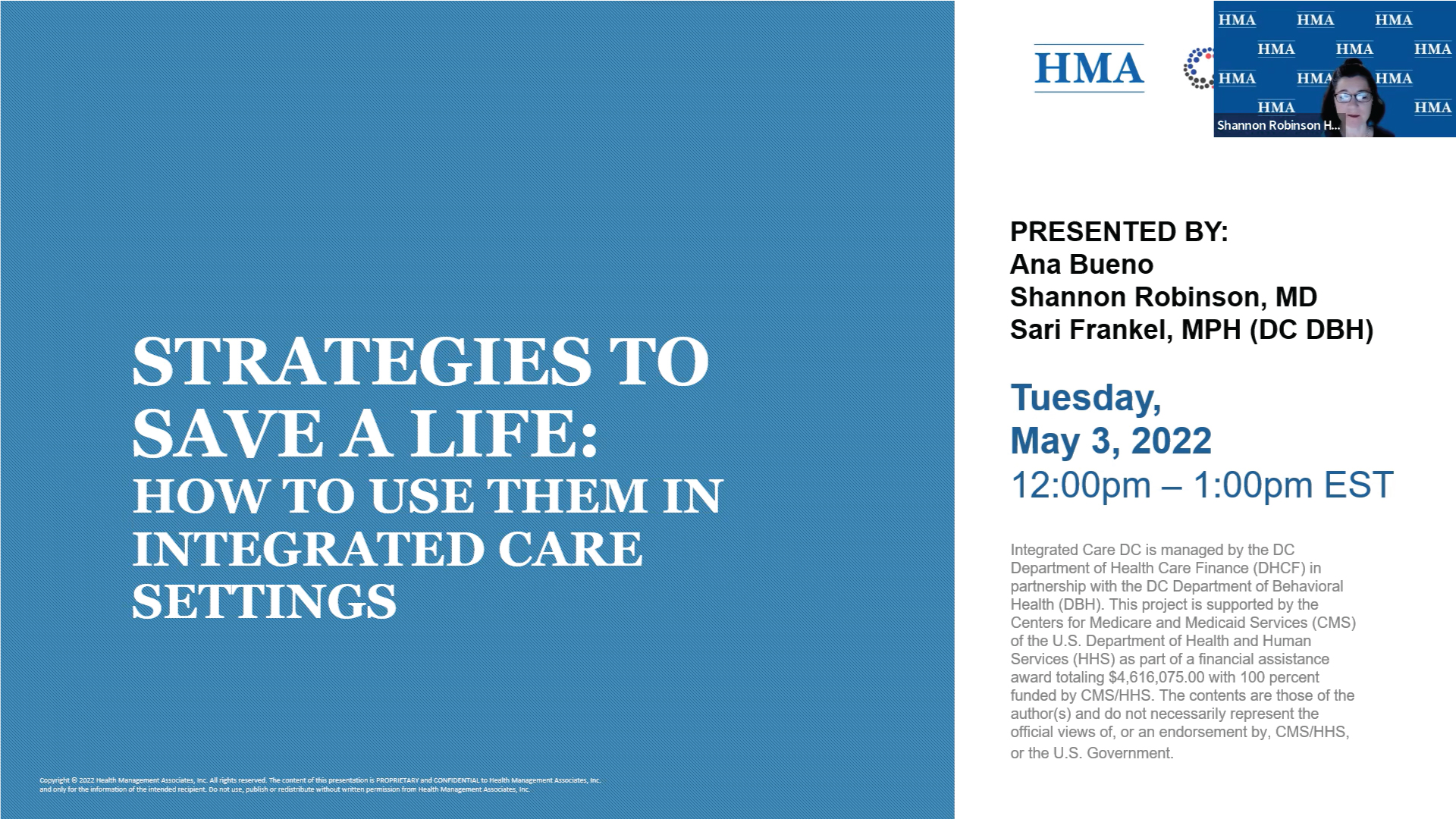
Harm Reduction Series Session 2: Strategies to Save A Life & How To Use Them In Integrated Care Settings
Health Management Associates invites you to join us for a lunch and learn workshop to learn more about Overdose Prevention and how to save a life in DC. In this interactive lunch and learn we will discuss DC’s Naloxone Distribution Program and the organizations currently providing Naloxone and provide: an overview of DC’s Standing Order and Samaritan Law an overview of the uses of opioids information on how naloxone stops an overdose and provide information on the action steps to take to save a life and stop an overdose. Where and how individuals can access naloxone, syringe services, and fentanyl test strips in DC.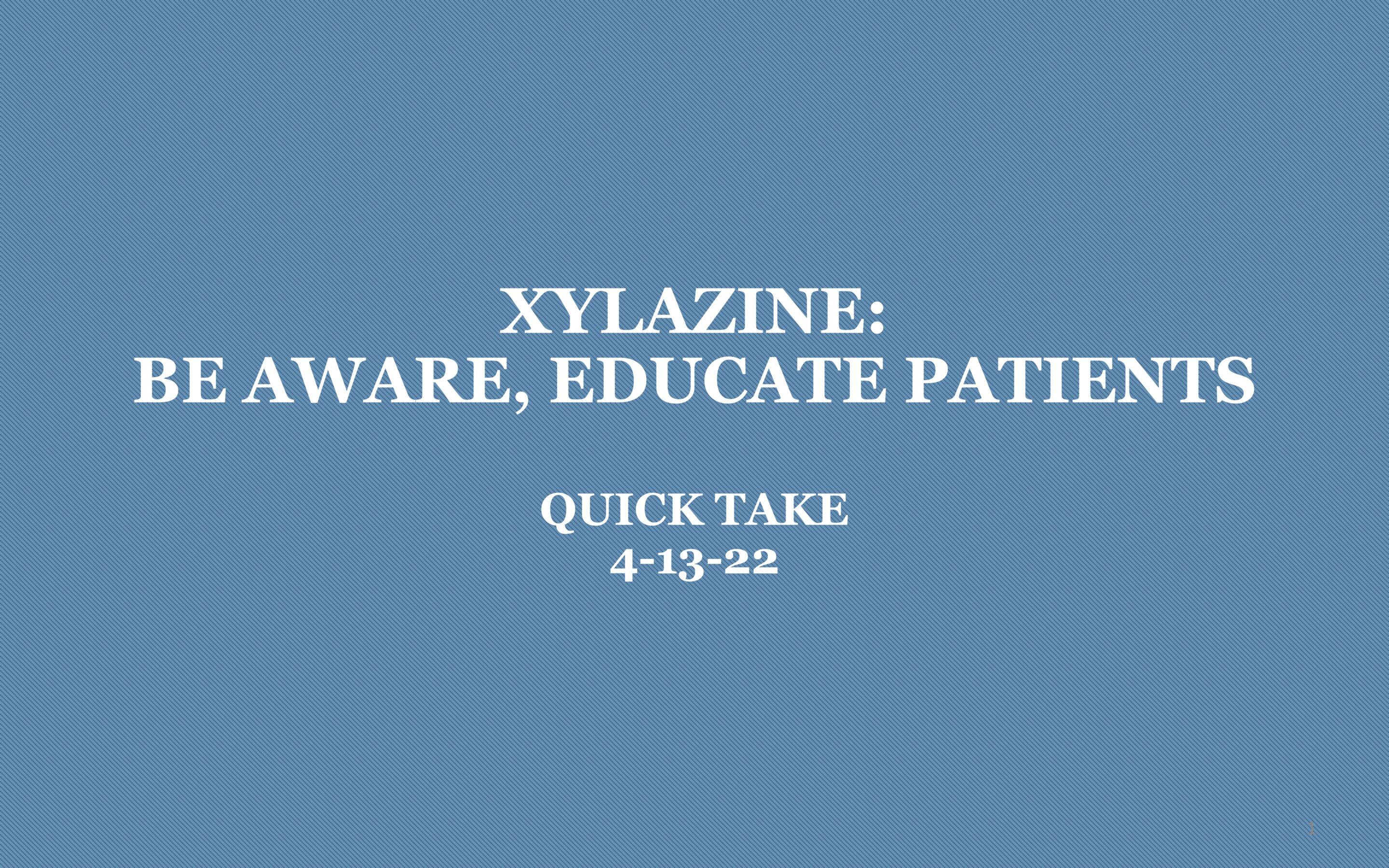
Xylazine: Dangerous Veterinary Sedative in Illicit Opioids (HMA)
Xylazine is rapidly increasing in the illicit drug supply. A powerful animal sedative, xylazine causes respiratory depression, bradycardia, and hypotension, raising the risk of overdoses and complicating the reversal of overdoses. Xylazine also causes unique skin lesions and risk for severe infections. This quick take gives basic information about xylazine.Perinatal Substance Use: Everything You Wanted to Know
Because many women and persons of childbearing age pregnant with SUD may not readily share information with providers and because pregnancy is a period where the motivation for change is extremely high, positioning providers to identify and care for this population has great potential for establishing a recovery path and changing lives. This webinar will review the risks and effects of SUD among women of childbearing age, pregnant and parenting persons and their affected infants, including screening and treatment considerations, breastfeeding decisions and ideal mechanisms for engagement and support of women and other pregnant persons on their recovery journey. We will also cover the short and long-term effects of SUD exposure on the infants, including non-pharmacologic alternative interventions and follow-up considerations.CCBHC Short Take: A Vehicle for Building & Sustaining Behavioral Health System Capacity
During this brief presentation, Kristan McIntosh, LMSW, shares an overview of what a Certified Community Behavioral Health Clinic (CCBHC) is, discusses why it is an important opportunity to build behavioral health system capacity, and talks about some upcoming opportunities to become (or partner with) a CCBHC.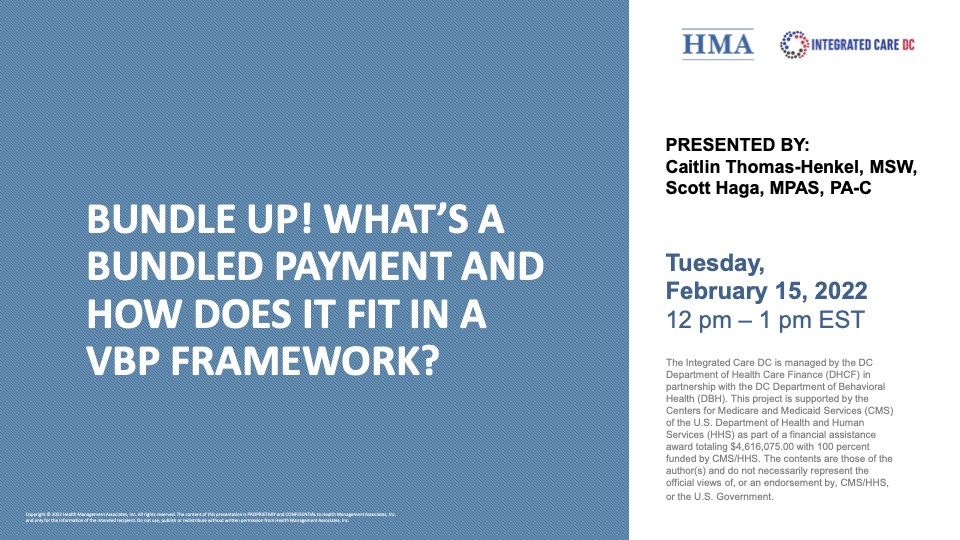
Bundle Up! What’s a Bundled Payment & How Does It fit Into a VBP framework?
This hour-long presentation will discuss the Value-Based Payment framework and where the Medicare bundled payment available to Opioid Treatment Programs (OTPs) fits. It will also include information about how to appropriately bill the bundled payment in various situations, and when to bill separately for additional services.MAT and Tele MAT Pre Appointment Self Assessment
This one-page self-assessment can be utilized before individual or group MAT appointments; this tool aligns with ASAM criteria allowing the provider to plan for the current session and to aid in treatment planning. With a slight modification, this could also be used by persons not on MAT in preparation for individual or group appointments for substance use disorders. Critical questions required for all telehealth appointments are reviewed, such as the address and phone number where the person can be reached today.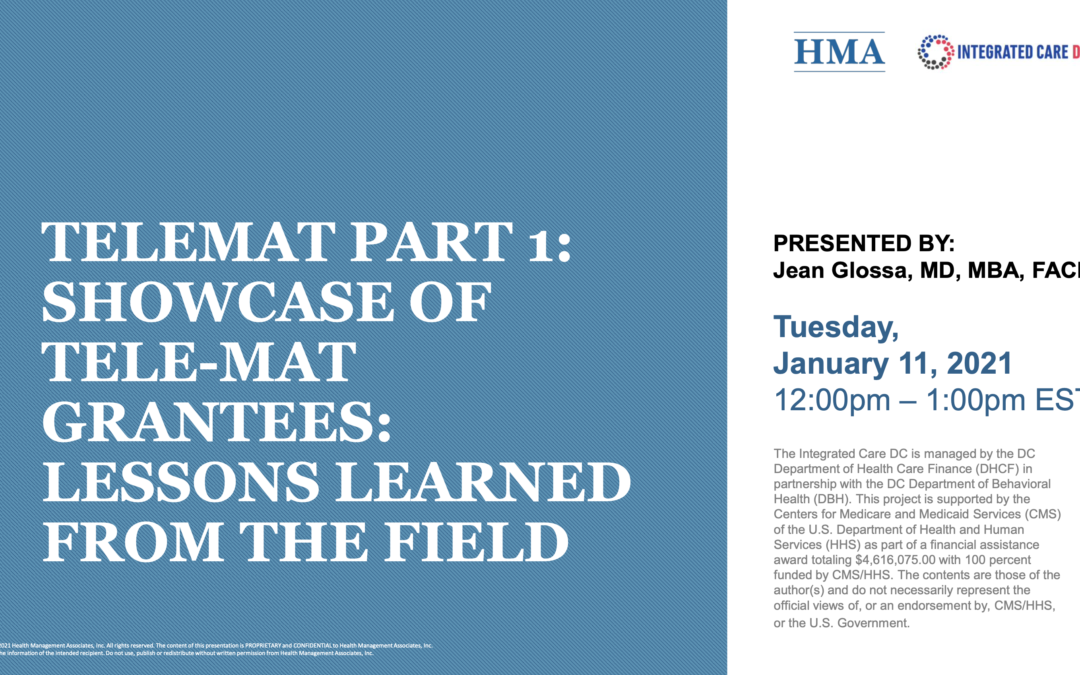
TeleMAT Part 1: Showcase of Tele-MAT Grantees: Lessons Learned From the Field
The Department of Health Care Finance (DHCF) awarded grants to local organizations to support new telehealth services for residents in Wards 7 and 8 as well as residents of homeless shelters and public housing developments. These projects connect patients to specialists using interactive audio, video, or other new technology. DHCF also awarded grants to local organizations to support telemedicine services among the District’s medication-assisted therapy (MAT) network of providers, including providers authorized (“waivered”) to treat opioid dependency with buprenorphine. During this session, we will hear from the three Tele-MAT grantees about their programs’ successes, challenges and lessons learned. An overview of Tele-MAT will be provided in part 2 of this series on January 25, 2021, 12:00pm - 1:00pm ET.Virtual Best Practices for Providers and Care Team Members
The front of this handout reviews what providers need to know, do and have a plan for prior to individual or group telehealth sessions. The back of the handout reviews important features of Zoom (TM) for those staff using Zoom (TM) as a platform for delivering telehealth sessions.Patient Guide to Starting Buprenorphine
This one-page handout will help patients understand when they will start buprenorphine, based on the last time they used opioids and their current level of symptoms. It describes how to take buprenorphine in order for it to help with cravings and withdrawal symptoms, what dose of medication to take when starting and afterwards, and other important information about buprenorphine.Integration During Pregnancy-With an emphasis on Pregnant People Who Are Using Drugs
This short take talks about the added importance of building trust and integrating culturally and linguistically evidence-informed social, physical and behavioral health services during pregnancy. The short take place particular emphasis on pregnant people who use drugs because historically stigma, racism and other isms have often meant their care has not been clinically appropriate.Clinical Guidance for Treating Pregnant & Parenting Women With Opioid Use Disorder & Their Infants
This Clinical Guide provides comprehensive, national guidance for optimal management of pregnant and parenting women with opioid use disorder and their infants. The Clinical Guide helps healthcare professionals and patients determine the most clinically appropriate action for a particular situation and informs individualized treatment decisions.Stress Management: Imagery
This short take video demonstrates how to teach and use guided imagery with your patients/clients for stress management. Guided imagery leverages the mind-body connection to efficiently relax the body through the use of imagination.Stress Management: Progressive Muscle Relaxation
This short take video is a demonstration of how to use progressive muscle relaxation as a strategy for stress reduction with your patients/clients. This technique for relaxation was developed in the 1920s by Dr. Edmund Jacobson. This technique has been now used for decades to address stress, anxiety, and depression and is used proactively as a strategy to maintain positive mental health and improve quality of life as demonstrated in studies.Stress Management: Deep Breathing/Diaphragmatic Breathing
This short take video demonstrates how to teach deep breathing techniques to a patient/client as a strategy for stress management. Abdominal breathing is the term often used to describe this breathing technique. The term belly breathing is often used with pediatric patients/clients. Breathing exercises can help individuals with stress or anxiety disorders. Abdominal breathing can mitigate hyperarousal in the body when under stress and help to focus the mind.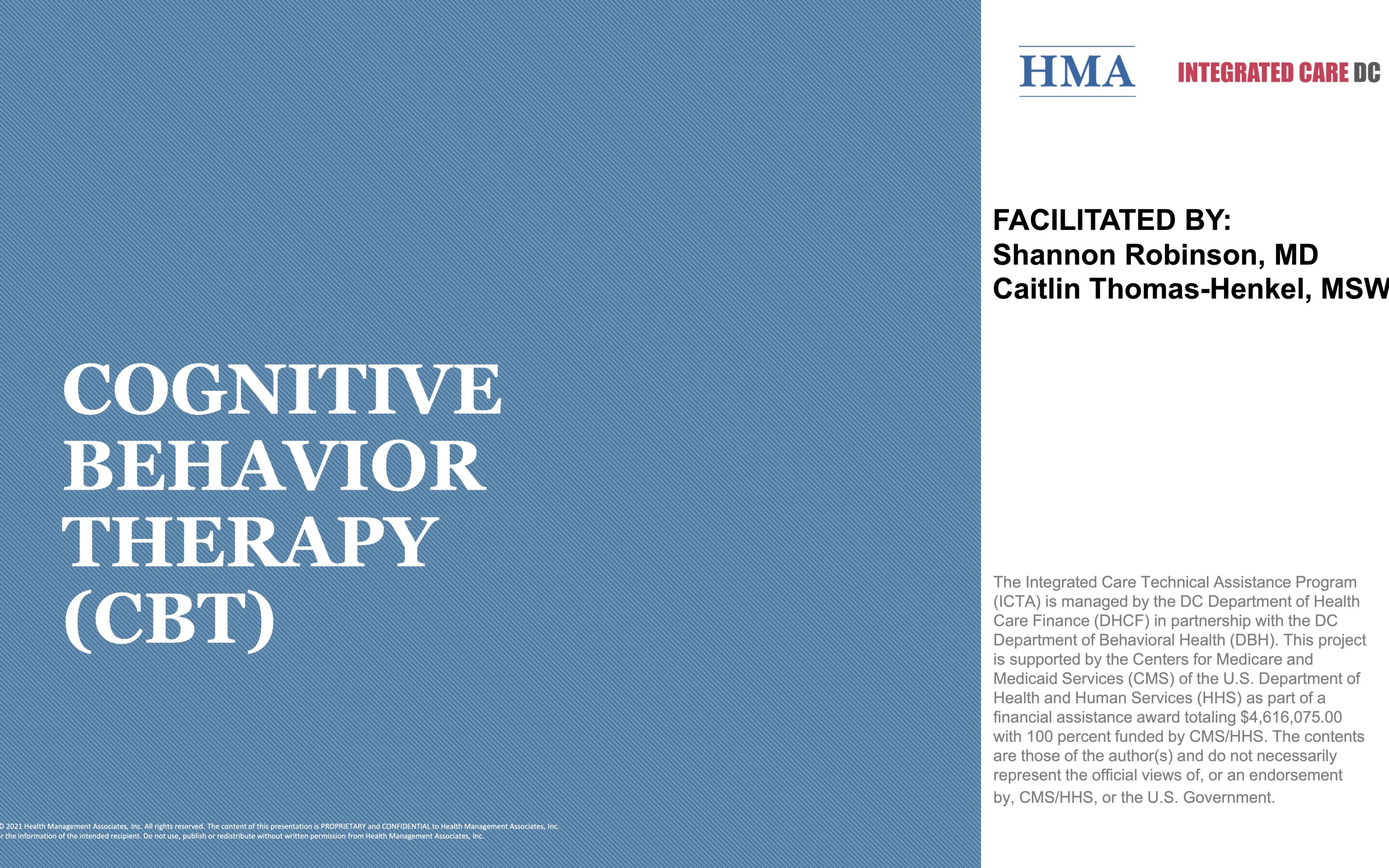
Cognitive Behavior Therapy (CBT)
Cognitive Behavioral Therapy (CBT) is a type of psychotherapeutic treatment that helps people learn how to identify and change maladaptive thought patterns that have a negative influence on behavior and emotions. This short take video will cover the key principles of CBT and a few basic techniques that are utilized for various conditions.
Contingency Management: Underutilized Evidence Based Treatment
Contingency management is an evidence-based treatment plan for substance use disorder. This type of treatment, a major topic in media and public policy circles, promotes behavior change and reinforces positive behaviors. This short take video discusses contingency management treatment in more detail and how to increase its use in more practices.Coping Skills for Trauma: Getting Into The Body
There are a variety of strategies and interventions to help individuals cope with the impact of trauma on their wellness and functioning. Many evidence-based treatments and promising treatments involve the teaching and use of skills to help the individual cope with trauma. One category of those skills is helping individuals to connect and get grounded in their body as a way to cope with and manage affect dysregulation, intrusive thoughts and imagery, distress and dissociation. Many new treatments for PTSD and trauma-related disorders are emerging that are focused primarily on working with the body to bring about relief. "Getting into the body" skills can be integrated into treatment for PTSD and trauma-related disorders or used in a consultation model to build mastery with the individual and support functional restoration.Coping Skills for Trauma: Experiencing Emotions
There are a variety of strategies and interventions to help individuals cope with the impact of trauma on their wellness and functioning. Many evidence-based treatments and promising treatments involve the teaching and use of skills to help the individual cope with trauma. One category of those skills is helping individuals to connect with and experience their emotions a way to cope with and manage affect dysregulation, intrusive thoughts and imagery, distress and dissociation. "Experiencing emotion" skills can be integrated into treatment for PTSD and trauma-related disorders or used in a consultation model to build mastery with the individual and support functional restoration.Evidence Based Practices Workshop 3 Problem Solving Therapy
Problem-Solving Therapy (PST) is a form of therapy that provides people with tools to identify and solve problems that arise from life stressors that can have a negative impact on their day-to-day lives. Its aim is to improve individuals’ overall quality of life and can be used to treat depression, among other conditions. It is based on a model that takes into account the importance of real-life problem-solving including how to manage real-life stressors when they arise. The presentation will cover key PST principles and tools that can be used in everyday life.Evidence Based Practices Workshop 2 Behavioral Interventions for Stress Management
There are many evidence-based techniques that are easy to learn and practice, with good results in individuals struggling with physical and mental health challenges. This workshop with briefly introduce participants to some of the more common and effective practices including progressive muscle relaxation, guided imagery, diaphragmatic breathing, relaxation response, and mindfulness-based stress reduction. Speakers: Shannon Robinson, MD (HMA), Marsha Johnson, MSW, LCSW (HMA)Evidence Based Practices Workshop 1 Cognitive Behavioral Therapy

Viewing Time 1 Hour
Pregnancy and Substance Abuse: A Harm Reduction Toolkit
This toolkit was designed to help community providers care for pregnant and parenting people who use drugs in a holistic manner. The kit includes information about stigma reduction, trauma-informed care, and legal services. While the guide was developed IN NY, there are engagement and other information that is useful regardless of location.Clinical Guidance for Treating Pregnant and Parenting Women With Opioid Use Disorder and Their Infants
SAMHSA supported the development of this guide in 2018 to promote evidence-informed care for pregnant and parenting women who have OUD. It includes modules on prenatal care, postnatal care, infant care, and more.Telehealth in a Post-Pandemic Era: Sustainable Approaches to Support Integrated Care – Test

Viewing Time 1 Hour
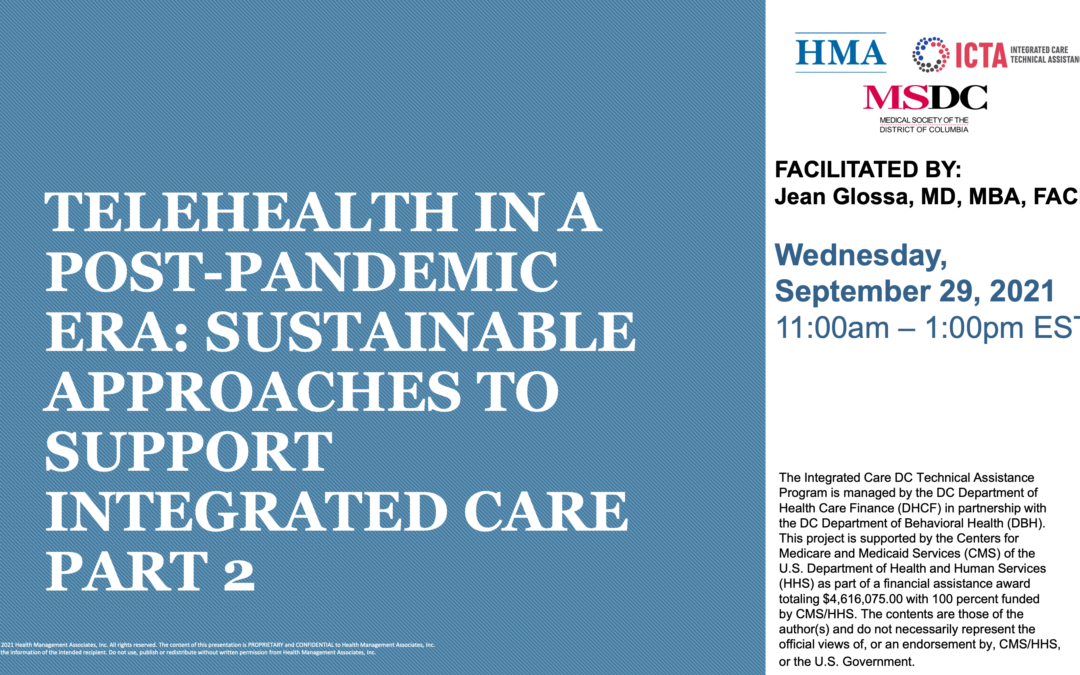
Telehealth in a Post-Pandemic Era Sustainable Approaches to Support Integrated Care – Part 2
This interactive virtual workshop is part two of a two-part series to support providers ongoing efforts to implement and sustain innovative models of telehealth following the COVID-19 public health emergency. Topics include best practices to support behavioral health care delivery through telehealth; improving patient engagement through telehealth and DC telehealth policy and priority updates.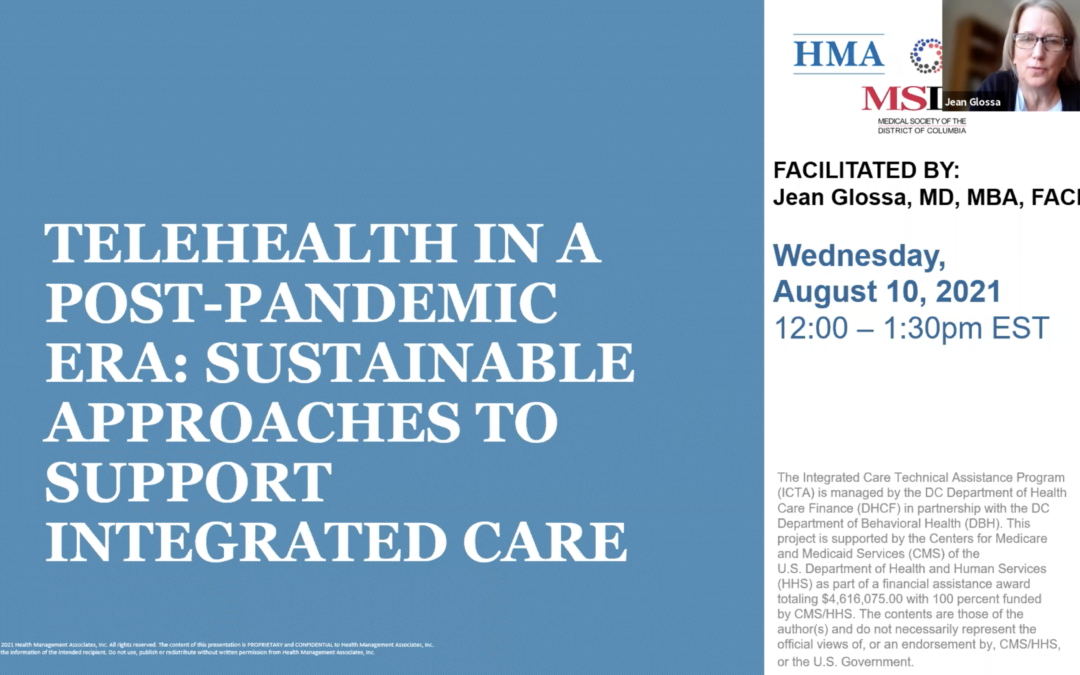
Telehealth in a Post-Pandemic Era: Sustainable Approaches to Support Integrated Care – Part 1
https://www.integratedcaredc.com/wp-content/uploads/2021/08/Webinar-Telehealth-in-a-Post-Pandemic-Era-Sustainable-Approaches-to-Support-Integrated-Care.mp4Webinar This interactive virtual workshop is part one of a two-part series to support providers ongoing efforts...Association of Cannabis Use During Adolescence With Neurodevelopment
Results suggest that cannabis use during adolescence is associated with altered neurodevelopment, particularly in cortices rich in cannabinoid 1 receptors and undergoing the greatest age-related thickness change in middle to late adolescence.Principles of Adolescent Substance Use Disorder Treatment: A Research-Based Guide
Correlates of Patient-Centered Care Practices at U.S. Substance Use Disorder Clinics
Substance use disorder treatment professionals are paying increased attention to implementing patient-centered care. Understanding environmental and organizational factors associated with clinicians’ efforts to engage patients in clinical decision-making processes is essential for bringing patient-centered care to the addictions field. This study examined factors associated with patient-centered care practices in substance use disorder treatment.Cannabis Use May be Associated with Suicidality in Young Adults
NIH study suggests a link between cannabis use and higher levels of suicidal ideation, plan, and attempt.An analysis of survey data from more than 280,000 young adults ages 18-35 showed that cannabis (marijuana) use was associated with increased risks of thoughts of...ASHP Guidelines on Preventing Diversion of Controlled Substances
Controlled substances (CS) diversion in health systems can lead to serious patient safety issues, harm to the diverter, and significant liability risk to the organization. Diversion driven by addiction puts patients at risk of harm, including inadequate relief of pain, inaccurate documentation of their care in the medical record, exposure to infectious diseases from contaminated needles and drugs, and impaired healthcare worker (HCW) performance. In addition to patient harm, there are regulatory and legal risks to the organization, including fraudulent billing and liability for resulting damages, and decreased community confidence in the healthcare system. These guidelines provide a detailed and comprehensive framework to support organizations in developing their CS diversion prevention program (CSDPP) in order to protect patients, employees, the organization, and the community-at-large. Ultimately, each organization is responsible for developing a CSDPP that complies with applicable federal and state laws and regulations but also one that applies technology and diligent surveillance to routinely review process compliance and effectiveness, strengthen controls, and seek to proactively prevent diversion.COVID-19: The Hidden Impact on Mental Health & Drug Addiction
Changes in Adult Alcohol Use and Consequences During the COVID-19 Pandemic in the US
Preliminary Data from the Drug Abuse Warning Network – April 2019-October 2020
Telehealth for the Treatment of Serious Mental Illness & Substance Use Disorders
This guide contains a foreword and five chapters. The chapters stand alone and do not need to be read in order. Each chapter is designed to be brief and accessible to healthcare providers, healthcare system administrators, community members, policymakers, and others working to meet the needs of people at risk for, experiencing, or recovering from SMI and/or SUD. The goal of this guide is to review the literature on the effectiveness of telehealth modalities for the treatment of SMI and SUD, distill the research into recommendations for practice, and provide examples of how practitioners use these practices in their programs.Use of the Family CAGE in Screening for Alcohol Problems in Primary Care
To establish the reliability and validity of the Family CAGE (an acronym indicating Cut down on drinking; Annoyed by complaints about drinking; Guilty about drinking; had an Eye-opener first thing in the morning), a four-item instrument intended to assess family alcohol-related problems.Implementing Care for Alcohol & Other Drug Use in Medical Settings An Extension of SBIRT
This change guide is designed to assist primary care clinicians and leaders to integrate care for patients with unhealthy alcohol and/or other drug use into routine medical care. As behavioral health care is increasingly integrated into medical settings, especially primary care, the focus is often on depression and anxiety. Care for alcohol and/or other drugs is often omitted or minimized, likely reflecting: stigma, lack of workforce training/education, and the traditional separation of care for alcohol and other drugs from traditional health care (e.g., primary care, emergency care, and behavioral health, etc.). This guide expands on and updates the widely recognized model of Screening, Brief Intervention, and Referral to Treatment (SBIRT).IBHA Recommended Measures to Assess Behavioral Health Integration in Primary Care
IBHA recommends that health systems, insurance plans, and others looking to measure progress toward integrating behavioral health in primary care use the 2017 PCPCH Standard 3.C.3 as the integration metric of choice. At the system level, IBHA concurs that measuring practice-level progress toward adopting excellent integrated care delivery models in the most meaningful way to affect system change.Fighting Back Against the Stigma of Addiction
Untreated drug and alcohol use contributes to tens of thousands of deaths every year and affects the lives of many more people. We have effective treatments, including medications for opioid and alcohol use disorders, that could prevent a significant number of these deaths, but they are not being utilized widely enough, and people who could benefit often do not even seek them out. One important reason is the stigma around those with addiction.Common Comorbidities with Substance Use Disorders Research Report
When two disorders or illnesses occur in the same person, simultaneously or sequentially, they are described as comorbid. Comorbidity also implies that the illnesses interact, affecting the course and prognosis of both.1,2 This research report provides information on the state of the science in the comorbidity of substance use disorders with mental illness and physical health conditions.Promoting Culturally & Linguistically Effective Screening Techniques
This module discusses the importance of employing culturally and linguistically effective strategies when r conducting screening and assessments.Adolescent Screening for Substance Use Disorders
Adolescents are at the highest risk for experiencing health problems related to substance use. This resource provides an overview of screening adolescents for substance use disorders including assessments and tips.